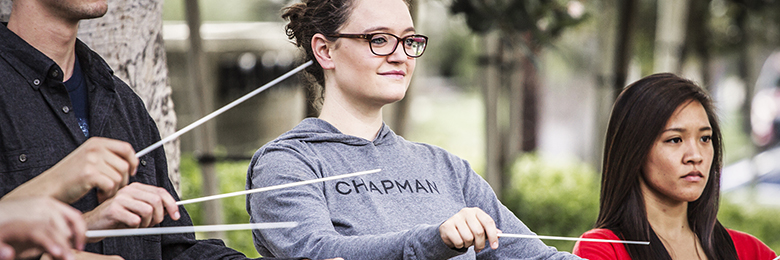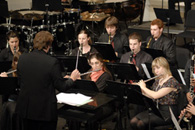The William D. Hall and Marybelle and Sebastian P. Musco Conservatory of Music is
one of the few schools in the nation to offer an undergraduate degree in conducting
(BM in performance, conducting emphasis - instrumental). The Hall-Musco Conservatory
is unique in that conducting students have the opportunity to conduct a full size
orchestra on a regular basis as part of their studies. Instrumental conducting students
can potentially work with The Chapman Orchestra and Wind Symphony. In addition, a
laboratory orchestra, comprised largely of instrumental performance majors, affords
hands-on experience on a weekly basis.

- Performance
- Bachelor of Music in Performance
- Conducting, Hall-Musco Conservatory of Music
- Guitar Performance
- Percussion Performance, Hall-Musco Conservatory of Music
- Collaborative Piano, Hall-Musco Conservatory of Music
- Solo Piano Performance, Hall-Musco Conservatory of Music
- Vocal Performance, Hall-Musco Conservatory of Music
- Woodwinds and Brass Performance, Hall-Musco Conservatory of Music
- Follow
»BM in Performance - Conducting
Instrumental Conducting
 The instrumental conducting curriculum features intensive concentration in a number
of important subject areas, including score study and analysis, score reading, aural
skills, repertoire, gestural analysis and rehearsal techniques.
The instrumental conducting curriculum features intensive concentration in a number
of important subject areas, including score study and analysis, score reading, aural
skills, repertoire, gestural analysis and rehearsal techniques.
Students are also instructed in the proper preparation of orchestral parts and are expected to intern in the Instrumental Music Library. This thorough approach to musical development provides students with a firm grounding in the materials and techniques they will need as mature artists.
All components of the program are designed to culminate in the senior recital, a public concert which the student plans, rehearses, and conducts with one of the large instrumental ensembles. The rigorous program is designed to prepare students for careers as exemplary school band and orchestra conductors, or to assist in gaining acceptance to any of the leading graduate conducting programs in the United States and abroad.
Students desiring to major in instrumental conducting must first apply for candidacy and after successfully completing Instrumental Conducting I and II (MUS 452 and MUS 453), may be considered for admission into the major. Admission into the instrumental conducting program is highly selective; the limited number of accepted students ensures regular podium time.
Program Learning Outcomes
PLO1: Musicianship
The student will demonstrate fluent musicianship skills, including an understanding
of music theory, proficiency with aural skills and sight reading, knowledge of different
musical styles and historical eras, a demonstration of basic piano skills, the ability
to rehearse and perform collaboratively and contribute to an ensemble, proficiency
with basic music technology and an understanding and demonstration of basic improvisation
techniques.
PLO2: Performance
The student will acquire performance skills as a soloist on his or her main instrument,
including knowledge in technique, historically appropriate performance styles and
repertoire and sight reading.
PLO3: Leadership
The student will observe and experience leadership roles and professional opportunities,
in order to prepare for a career as a performer.
PLO4: Pedagogy
The student will employ pedagogical techniques and skills relevant to his or her instrument
family.
- Featured
- News
- Events
- View All News »View All Events »
-
 View the published page to see this section.
View the published page to see this section.
- Performance
- Bachelor of Music in Performance
- Conducting, Hall-Musco Conservatory of Music
- Guitar Performance
- Percussion Performance, Hall-Musco Conservatory of Music
- Collaborative Piano, Hall-Musco Conservatory of Music
- Solo Piano Performance, Hall-Musco Conservatory of Music
- Vocal Performance, Hall-Musco Conservatory of Music
- Woodwinds and Brass Performance, Hall-Musco Conservatory of Music
